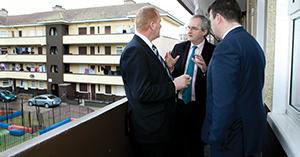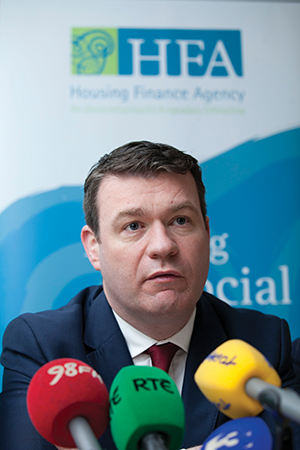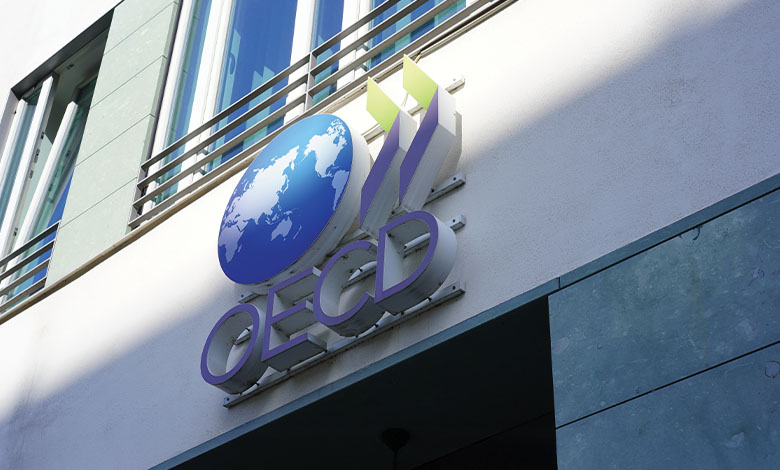Building Great Homes and Thriving Communities
16th April 2015Building Homes / Supporting Communities
18th September 2015Shaping a positive future
Barry O’Leary, Chief Executive of the Housing Finance Agency (HFA), says that with a recent €300 million fund now fully subscribed and additional funding available, the HFA is open for business keen to lend.
Housing Finance Agency plc (HFA) is a semi-State body which was established in 1982 to lend directly to local authorities and, since 2012, also to approved housing bodies (AHBs). The HFA comes under the Department of the Environment, Community and Local Government’s (DECLG) umbrella but its main shareholder is the Minister for Public Expenditure and Reform.
The HFA’s mission is to facilitate social housing policy by sourcing finance and lending it onto its customers at suitably low interest rates. The HFA is self-financing and is not in receipt of Exchequer funds. It has 12 staff and made a profit of €14 million last year, which is modest given the size of its loan book.
As at 31 December 2014, the HFA’s outstanding loan book totalled €4.25 billion, most of which is lent directly to local authorities. €3 billion of the total is for non-mortgage lending, to finance local authority social housing provision, where tenants pay a nominal rent. The remaining €1.25 billion is for the provision of standard annuity mortgages lent to local authorities who, in turn, on-lend to individual borrowers.
The HFA manages its sizeable loan book with a small staff complement, and this is enabled by the HFA’s online loan application and billing system, whereby local authorities can apply for loan finance without the need for paper transactions. This enables the HFA to issue local authority loans within 4-5 working days. DECLG and Local Government Auditor personnel also have access to this system enabling the sharing of online data.
The HFA has never had any arrears on its loan book. Lending to local authorities for mortgage purposes is at 1.25 per cent and this is passed onto individual home-owners at a variable rate of 2.55 per cent, which is circa 1.40 per cent below the average standard variable mortgage rate available on the market. The lower rates obtained by the HFA reflect the fact that it is State guaranteed and this advantage is passed on to HFA customers.
Approved Housing Bodies
Up until 2012, Government grant-funded housing bodies for social housing through local authorities. With the emergence of the economic crisis, and the resultant tight budgetary constraints, there was a rationale for the introduction of loan finance in replacement of grants, and for lending directly to AHBs to enable social housing projects to be completed more quickly. The HFA was given a central role in this endeavour, in the provision of loan funding for the sector, in the absence of competitive rates and tenors, at the time, in the market.
The HFA established a process for the assessment of AHBs for ‘Certified Body’ status, i.e. deemed suitable for the provision of loan finance. The assessment process for AHBs is in two parts. The first is a market standard corporate review which uses a scoring matrix to assess current performance, corporate governance, and development & financial plans. The application is then brought before the HFA’s Credit Committee for consideration. Following this, applicants are then awarded Certified Body status and can apply for funding on a case-by-case basis. The approval process is rigorous with, to date, 13 out of 26 applicants approved. However, all AHB loan applications received by the HFA have been approved.
One of the main issues for concern highlighted in AHB assessments has been in the area of development and financial planning. The HFA has sought to improve the bodies’ capacity in this area by championing the use of financial modelling software that is widely used across the UK housing sector. The HFA is funding the provision of user licences and training for the next 12 months for all certified bodies not currently using this platform. The introduction of a uniform development platform for the sector has been welcomed by the Interim Regulator and will bring undoubted benefits.
Another area that has had to be addressed by several applicants is in corporate governance, with issues highlighted such as in-house financial expertise and the skills capacity of some boards. Boards have generally geared up to address these issues and a number of applicants, who were initially declined, have since been approved on re-application.
To date, the HFA has approved over €100 million in AHB loan finance consisting of a mix of turnkey, refurbishment and new-build projects, as well as Mortgage-to-Rent finance. Overall, this represents the provision of 1,066 housing units to date. It is anticipated that there will be a significant increase in AHB loan applications over the next 12 months.
Social Housing Delivery
Government’s Social Housing Strategy 2020 sets out an ambitious plan for the growth of the sector over the next five years. The Strategy utilises a number of work streams targeting different aspects of the Plan, and the HFA is actively involved in the Project Board and the Finance Work Stream.
Central to the implementation of the plan is the establishment of off-balance sheet funding sources, which can be used to finance the development of new projects away from the Government’s balance sheet. The Finance Work Stream, as well as a number of specialised sub-committees, is focussed on this aspect of the Plan. While the work is at a relatively early stage and there are significant challenges, given the tightening regulations around off-balance sheet treatment, a number of options, including the development of an off-balance sheet funding vehicle, are under review and the HFA is lending its support and expertise to this process.
Currently any funding the HFA does is categorised as on-balance sheet; however, it is likely that any new off-balance sheet vehicle will look to tap into the HFA’s knowledge and experience with respect to lending to the local authority and AHB sectors.
While the DECLG sees the local authorities as central to delivering the bulk of the targets outlined in its Strategy, it also envisions the AHB sector playing a key role in social housing delivery and the sector is gearing up capacity to deliver on that. Without consolidation to generate scale, this will be challenging for a fragmented sector with around 500 approved housing bodies in Ireland. In addition to the large number of housing bodies, there is also the issue of size – some of the larger bodies are small relative to those found in the UK. Clúid, Oaklee and Túath are well run professional organisations but, on their own, are unlikely to achieve the targets set by the Strategy.
European Investment Bank
The importance of the HFA’s experience in lending to AHBs was evident in the European Investment Bank’s (EIB) approach to supporting social housing development in Ireland.
The EIB sought to utilise the HFA’s infrastructure and experience to access the market, which led to the successful completion of a €150 million Finance Contract between the EIB and the HFA. Under the terms of the Contract, the EIB will lend up to 50 per cent of the costs of social housing projects, including new builds and refurbishment/retrofitting. The HFA will, in turn, finance the remaining 50 per cent creating an overall fund of €300 million for the sector.
The terms of the funding are very attractive for AHBs, currently offering 25 year fixed rate funding at 3.25 per cent. With the move from grant aid to loan finance, and the risk-averse nature of the sector, housing bodies have a clear need for long-term fixed rate funding. This funding meets the AHB’s needs perfectly, allowing them to de-risk their financing at very competitive rates, significantly below what they might get from commercial lenders. The cash flows that remunerate these loans are from Payment and Availability Agreements with the respective local authority, at returns that significantly exceed the cost of the financing. The EIB funding is also available to local authorities and will be operable until end-2018.
The objective of the Fund is to improve the life of EU citizens. This is reflected in the conditions of its loans with Building Energy Rating (BER) targets for new buildings at A3 and for refurbishments at C1. There is also an emphasis on the community aspects of any projects funded.
The €300 million fund was launched by Minister Alan Kelly TD and Minister of State Paudie Coffey TD, in February of this year. Subsequently, the HFA has approached all Certified AHBs with details of the loan scheme and the relevant documentation has been largely completed. The HFA has made provisional allocations to the fund against projections made by AHBs, which will be reviewed on a quarterly basis, and allocations will be changed depending on progress. The €300 million EIB fund is currently well over-subscribed. Given the relatively small number of AHBs accessing finance, the fund will be actively managed on a “use it or lose it” basis.
Once this fund had been put in place, the HFA was approached by a similar bank – the Council of Europe Development Bank (CEB) – and we are in discussions with it to develop another facility on similar terms.
The HFA offers a wide suite of products at very competitive rates to the local authority and AHB sectors. In addition to the EIB supported funding, AHBs can access 10 year fixed rate finance at 3.85 per cent (local authorities are offered a comparable product at 3.25 per cent); up to 30 year variable rate finance currently at less than 3 per cent, as well as Acquisition, New Build and Mortgage-to-Rent products. The HFA is well positioned to play a central role in ensuring that any development plans can be supported with competitive and flexible financing which will meet our customers’ needs.
The Taoiseach, speaking at a recent event, stated that homelessness “is not a question of money, it is not a question of lack of resources” – the key challenge for AHBs in the coming months and years is to access the available funding and build new homes.
Housing Finance Agency plc
46 St Stephen’s Green
Dublin 2
+353 1 872 5722
www.hfa.ie









